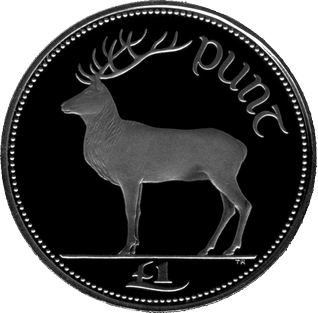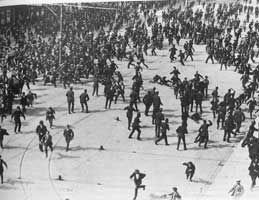Related Research Articles

The Winter of Discontent was the winter of 1978–79 in the United Kingdom, during which there were widespread strikes by public sector trade unions demanding larger pay rises, following the ongoing pay caps of the Labour Party government led by James Callaghan against Trades Union Congress opposition to control inflation, during the coldest winter for 16 years.

The Central Bank of Ireland is Ireland's central bank, and as such part of the European System of Central Banks (ESCB). It is the country's financial services regulator for most categories of financial firms. It was the issuer of Irish pound banknotes and coinage until the introduction of the euro currency, and now provides this service for the European Central Bank.
Bank of Ireland Group plc is a commercial bank operation in Ireland and one of the traditional 'Big Four' Irish banks. Historically the premier banking organisation in Ireland, the Bank occupies a unique position in Irish banking history. At the core of the modern-day group is the old Bank of Ireland, the ancient institution established by Royal Charter in 1783.

Allied Irish Banks, p.l.c. is one of the so-called Big Four commercial banks in Ireland. AIB offers a full range of personal and corporate banking services. AIB Capital Markets is the division of the company that offers international banking and treasury operations. The bank also offers a range of general insurance products such as home, travel, and health insurance. It offers life assurance and pensions through its tied agency with Irish Life Assurance plc.

The đồng has been the currency of Vietnam since May 3, 1978. Issued by the State Bank of Vietnam, it is represented by the symbol "₫". Formerly, it was subdivided into 10 hào, which were further subdivided into 10 xu, neither of which are now used. Since 2012 the use of coins has decreased greatly, and since 2014 coins are generally not accepted in retail, but will still be accepted in some, but not all, banks.
Thomas "Slab" Murphy is an Irish republican, believed to be a former Chief of Staff of the Provisional Irish Republican Army. His farm straddles County Armagh and County Louth on the border between Northern Ireland and the Republic of Ireland. In December 2015, Murphy was found guilty on nine counts of tax evasion following a lengthy investigation by the Criminal Assets Bureau of the Republic of Ireland. In February 2016, Murphy was jailed and sentenced to 18 months in prison. One of three brothers, Murphy is a lifelong bachelor who lived on the Louth side of his farm before his imprisonment.

The economic history of the Republic of Ireland effectively began in 1922, when the then Irish Free State won independence from the United Kingdom. The state was plagued by poverty and emigration until the 1960s when an upturn led to the reversal of long term population decline. However, global and domestic factors combined in the 70s and 80s to return the country to poor economic performance and emigration. The 1990s, however saw the beginning of unprecedented economic success, in a phenomenon known as the "Celtic Tiger", which continued until the 2008 global financial crisis, specifically the post-2008 Irish economic downturn. It also led to the Republic of Ireland becoming the most indebted state in the European Union. As of 2015, the Republic has returned to growth, and was the fastest growing economy for that year. Since August 2017, Irish unemployment has been at a 9 year low of 6.1%.

The Dublin lock-out was a major industrial dispute between approximately 20,000 workers and 300 employers which took place in Ireland's capital city of Dublin. The dispute lasted from 26 August 1913 to 18 January 1914, and is often viewed as the most severe and significant industrial dispute in Irish history. Central to the dispute was the workers' right to unionise.

The Union of Construction, Allied Trades and Technicians (UCATT) was a British and Irish trade union, operating in the construction industry. It was founded in 1971, and merged into Unite on 1 January 2017.

The New Industrial State is a 1967 book by John Kenneth Galbraith. Three revised editions appeared in 1972, 1978 and 1985.
Brian Murphy is an Irish hurler who plays as a full-back for the Cork senior team.
John Horgan was an Irish hurler whose league and championship career with the Cork senior team spanned twelve years from 1969 to 1981. He is widely regarded as one of the greatest hurlers in the history of the game and as one of the most iconic Cork players of all time.
Martin Coleman is an Irish retired hurler who played as a goalkeeper for the Cork senior team.
Denis Murphy is an Irish retired hurler who played as a left corner-back for the Cork senior team.

The Depression of 1920–21 was a sharp deflationary recession in the United States and other countries, beginning 14 months after the end of World War I. It lasted from January 1920 to July 1921. The extent of the deflation was not only large, but large relative to the accompanying decline in real product.

The post-2008 Irish banking crisis was the situation whereby, due to the Great Recession, a number of Irish financial institutions faced almost imminent collapse due to insolvency. In response, the Irish government instigated a €64 billion bank bailout. This then led to a number of unexpected revelations about the business affairs of some banks and business people. Ultimately, added onto the deepening recession in the country, the banks bailout was the primary reason for the Irish government requiring IMF assistance and a total restructuring of the Irish Government occurred as result of this.

The post-2008 Irish economic downturn in the Republic of Ireland, coincided with a series of banking scandals, followed the 1990s and 2000s Celtic Tiger period of rapid real economic growth fuelled by foreign direct investment, a subsequent property bubble which rendered the real economy uncompetitive, and an expansion in bank lending in the early 2000s. An initial slowdown in economic growth amid the international financial crisis of 2007–08 greatly intensified in late 2008 and the country fell into recession for the first time since the 1980s. Emigration, as did unemployment, escalated to levels not seen since that decade.
The National Asset Management Agency is a body created by the government of Ireland in late 2009, in response to the Irish financial crisis and the deflation of the Irish property bubble.
The Chinese Banking Liquidity Crisis of 2013 was a sudden credit crunch affecting China's commercial banks evidenced by a rapid rise on 20 June 2013 in the Shanghai interbank overnight lending rates to a high of 30 percent from its usual rate of less than 3%. The ensuing panic affected gold markets and stock. China's regulation of the foreign exchange market had caused a decline in inflow of cash. On 19 June 2013, instead of injecting additional funds and easing its monetary policy, China's central bank People's Bank of China (PBOC) told commercial banks to "make full use of incremental funds and revitalize stock options." On 24 June 2014 the PBOC told commercial banks to "control the risk associated with credit expansion" effectively increasing the scrutiny of shadow banks' lending practices. This resulted in a sudden shortfall in the cash market resulting in short term repo rates in excess of 25%. In effect China was using market forces to manage the economy.

A general strike is a strike action in which a substantial proportion of the total labour force in a city, region, or country participates. General strikes are characterised by the participation of workers in a multitude of workplaces, and tend to involve entire communities. General strikes first occurred in the mid-19th century, and have characterised many historically important strikes.
References
- ↑ Antoine E. Murphy (March 1978). "Money in an economy without banks: The case of Ireland". The Manchester School. 46 (1): 41–50. doi:10.1111/j.1467-9957.1978.tb00151.x.
- ↑ "How six-month bank strike rocked the nation". Irish Independent. December 29, 1999. Archived from the original on August 2, 2012.
- ↑ Brendan Keenan (August 5, 2010). "It's 1970: Industrial unrest and a jobless rate of 7pc are key concerns". Irish Independent.